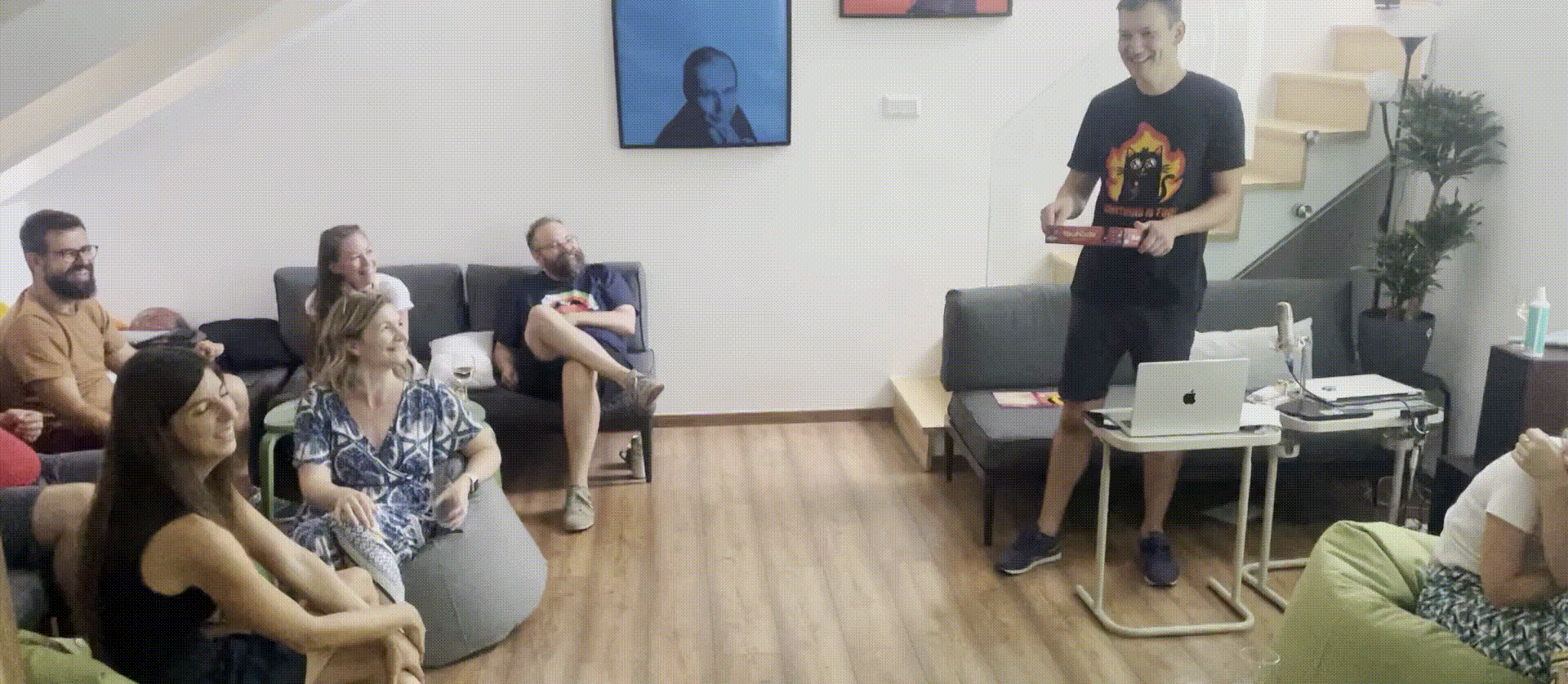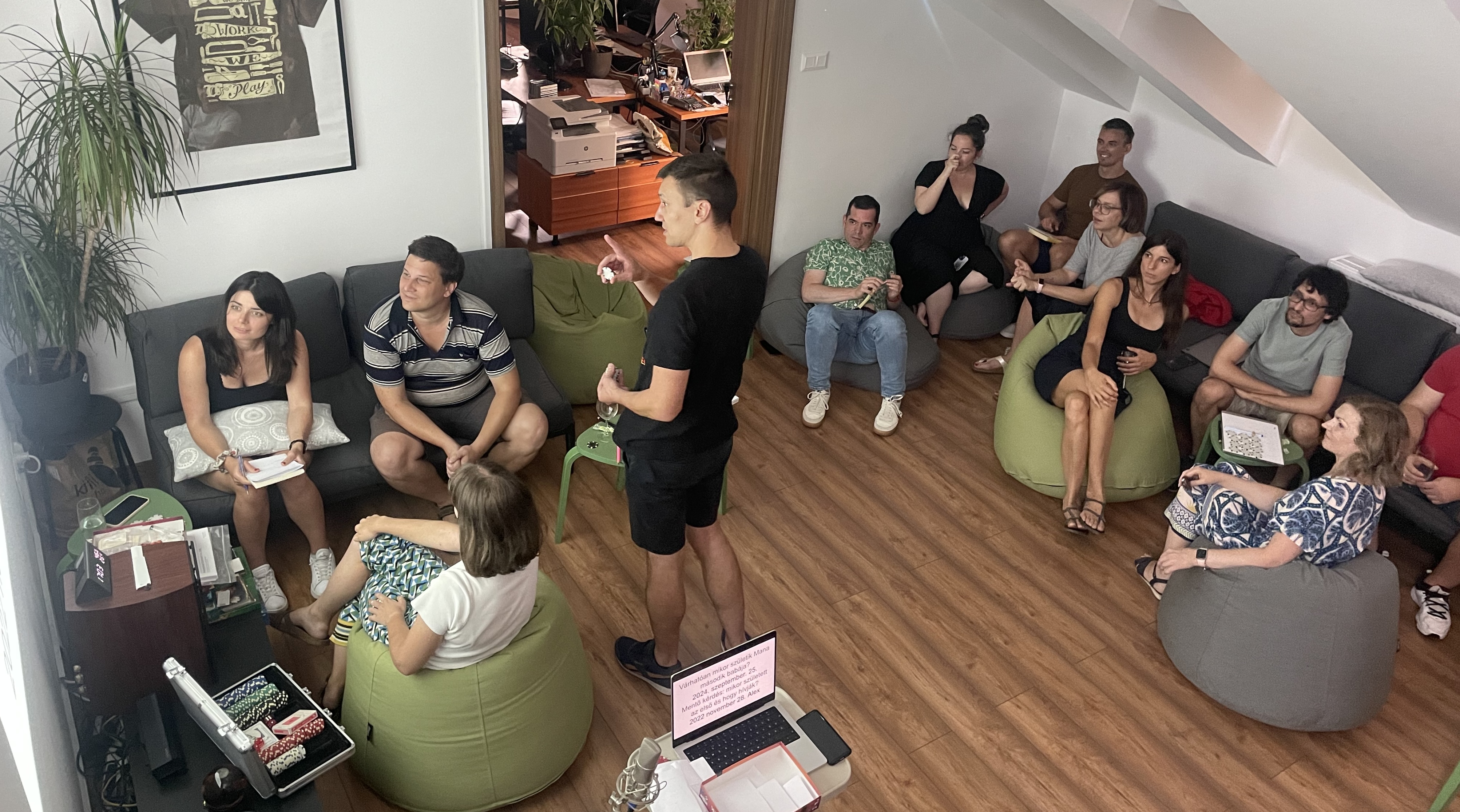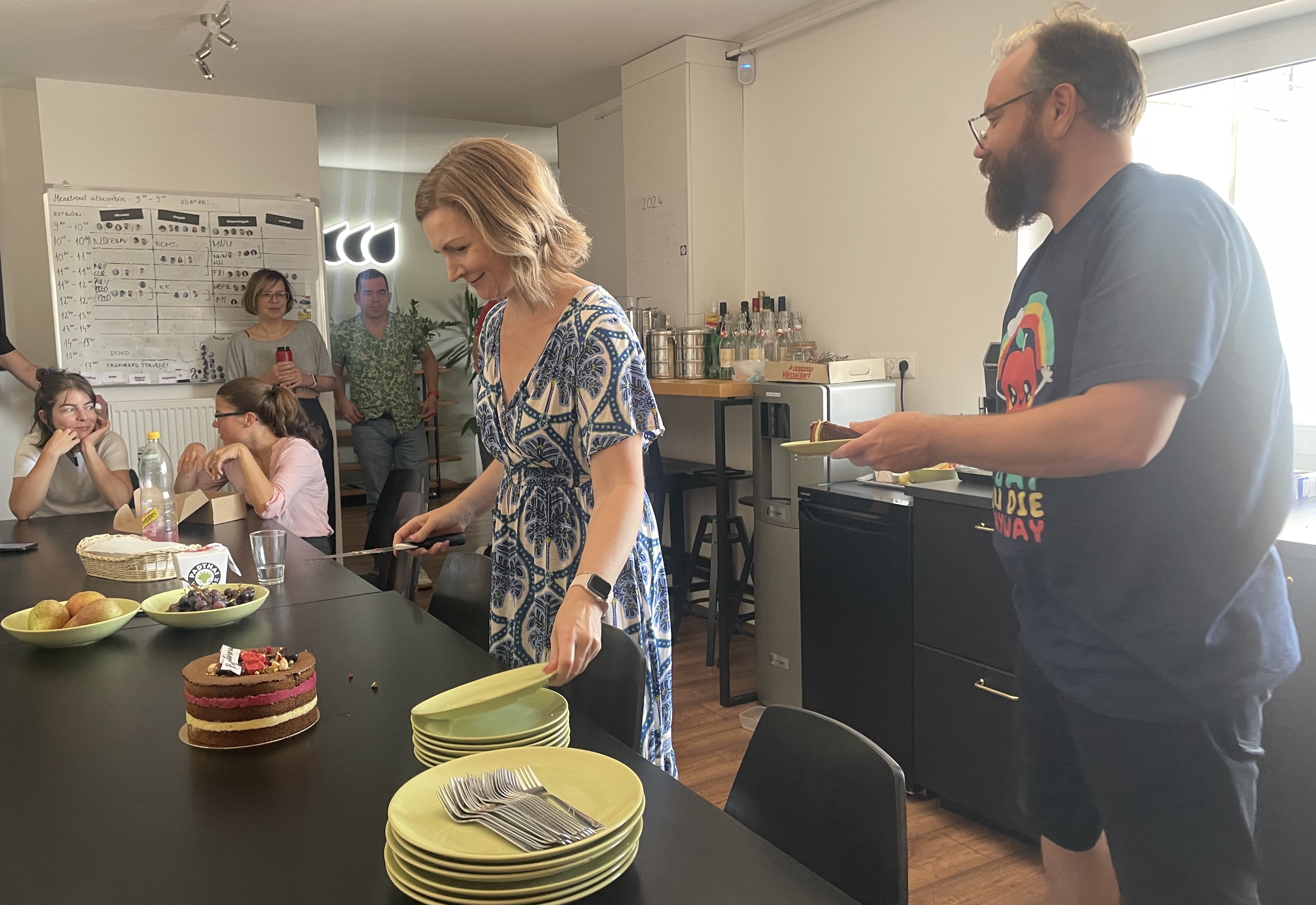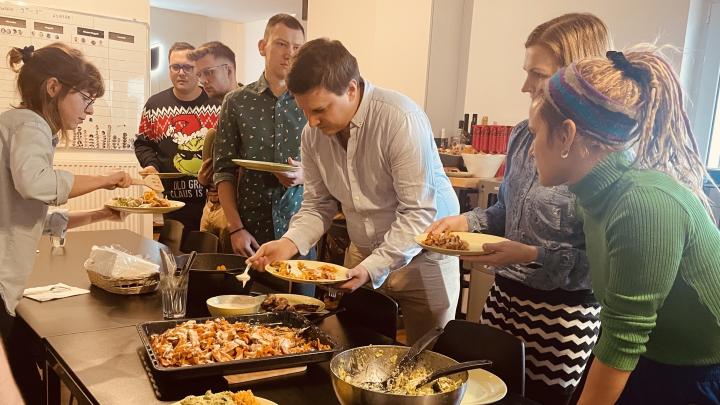
I was eagerly preparing for our fifteenth anniversary. I tried to find the right format, the story that would allow us to look back on the past years. I wrote a tale about a girl who embodies our community, added a few symbols to it, and then rewrote the story. And then once again. Finally, something emerged that I could share with others. The whole experience felt like a smoky jazz improvisation: I got lost in it, perhaps even enjoyed it more than the audience.
The creative process helped me to rethink the past fifteen years. I was curious about the next step, the one we cannot yet see, the one we will create together. What is the impact we generate with our current situation? How can we continue to develop, and what do we need for that to happen?
At the end of the story, we celebrated with chocolates, and then the long-awaited game master, Tomi, arrived, and the main event began. Everyone wrote down three challenging statements, and the task was to guess who they were about. We spiced up the game with some pre-planned questions, and an hour and a half flew by. With the invited guests joining us, endless board games and conversations began.
Together with active and former members, we have spent a total of 225 years together. Seven of us have been working at Integral Vision for over ten years, and the average time spent by current colleagues at the company is eight years.
Thoughts have power. What we think of ourselves today shapes the company of the future, so it is important to occasionally stop and consciously reflect on the ideas that have made us who we are today.

15 years, 15 impact
Over the past fifteen years, our community has experienced numerous impulses, and these experiences have brought significant changes for us. Without aiming for completeness, here are some guidelines and ideas that have been defining for our current operations.
1. Ken Wilber: Integral Vision
Ken Wilber's AQAL model, which we revisited multiple times in the early years, served as an important inspiration for us. The model helped us see our organization differently — not just as a money-making machine, but as a community where growth and the unfolding of our potential are valuable in themselves, not merely for the profit they generate. I consider Wilber the "godfather" of the company, and his work, Integral Vision, excellently summarizes the map we also follow.
From Ken Wilber's extensive body of work, it is worth highlighting A Brief History of Everything, which provides a concise yet comprehensive overview of the integral perspective.
2. Stephen Covey: The speed of trust
Trust, as a core value, is a cornerstone of Integral Vision. I always recommend a few books to new members, but among them, this one might be the most important. If we see trust as a skill, it becomes clear how much we need to do daily to strengthen it both within our community and with our partners. Stephen M. R. Covey's book has had a profound impact on me and still holds significant importance today.
3. Seth Godin: Everybody matters
Seth Godin was an important source of inspiration for us in the early years. He reinforced the principle that it is worth focusing on what one does with genuine passion. Recently, he released a new book titled Everybody Matters – Extraordinary Power of Caring for Your People Like Family, which also carries significant ideas. The book's message aligns with our approach in everyday life: "A person is not just a resource. A person is the essence."
We also strive to adhere to this mindset in our daily operations.
4. Henrik Kniberg és Mattias Skarin: Kanban and Scrum - making the most of both
The agile methods we learned before the founding of Integral Vision have probably had the most significant impact on our work organization, and this influence is still felt today. From the very beginning, we have applied a blend of Scrum and Kanban: working in sprints, daily standups, as well as sprint closing and opening rituals are integral parts of our company’s everyday operations.
5. Daniel Pink: Drive
Daniel Pink brilliantly summarizes motivation research and presents it in a way that is easily applicable for a corporate community. This book served as a real compass for us in understanding how to approach external and internal motivation. It saved us from many poor decisions and helped us establish good habits.
6. Edward de Bono: Simplicity
Bono clearly explains how understanding can create simplicity. He believes it is important to know exactly what we want, understand our values, and consider all relevant aspects. To truly understand a situation or process, it is essential to be well-versed in the given topic; otherwise, instead of achieving simplicity, we might end up with primitive results. True simplicity requires deep understanding because only the simplicity that comes from understanding has real value.
In addition to general principles, he has also developed specific, thought-provoking methods that have proven useful for delving deeper into certain topics. Related article: Simplicity as a Value.
7. Cali Ressler & Jody Thompson: Why Work Sucks and How to Fix It
This book encourages us to finally abandon our time- and location-based work accounting system. According to the authors, it doesn’t matter how much you work or where you do it; what matters is the quality and quantity of the value you create.
We adopted the ROWE (Result Only Work Environment) principle long before COVID and the possibility of mass remote work emerged. The core of this principle is that performance metrics should reflect results achieved, not time spent. Everyone can do whatever they want, as long as they fulfill their committed tasks.
I introduced this idea to the company twelve years ago, and through numerous discussions, we slowly found a way to integrate it into the daily life of our community. Today, we have reached a point where there is hardly any tension around this, while everyone is responsible for managing their own time.
8. Martin Seligman: Flourish
Although Seligman's book primarily deals with the components of individual well-being, the principles he presents can also be excellently applied to communities. This topic gained more emphasis in our team around seven years ago, and since then, we have introduced several well-being-focused practices that continue to shape our daily lives.
Related articles: Company Well-being, Do They Really Talk About Their Frustrations?
9. Marshall Rosenberg: Nonviolent Communication
We drew inspiration for Nonviolent Communication (NVC) from many sources: we participated in various workshops that laid the foundation for our common language in terms of assertiveness. Nowadays, everyone understands why it is important to speak clearly about feelings, needs, and requests.
Related articles: The Language of Connection, Hidden Power. You can access Marshall Rosenberg's book here, and his lecture here.
10. Frederic Laloux: Reinventing organisations
The idea of a self-organizing company is exciting. When Laloux's book was published, many company leaders and organizational developers recognized in it the direction they had long desired. The principles are clear, and the concept is inspiring, but such a transition poses challenges similar to transforming a company operating in a waterfall model into one with an agile mindset.
At Integral Vision, we had already laid the foundations for self-organization years earlier, but Laloux's book further clarified the picture. Currently, we are striving to move from a green, familial atmosphere to a teal organization, which requires addressing several deficiencies at the lower levels. Related article: Social Trust and Self-Organization.

11. Maslow: Toward a Psychology of Being
Abraham Maslow's Toward a Psychology of Being is an essential read for anyone seeking the path to self-actualization, personal growth, and a more fulfilling life. I read this book long before founding the company, and it was perhaps the most influential work that inspired me to create a human-centered company culture that supports the unfolding of individual potential.
This book is particularly important for Integral Vision, as our community is based on the very principles Maslow emphasizes: the significance of peak experiences, the full development of human capabilities, and a commitment to self-actualization. Maslow's ideas help us understand how we can achieve higher goals both individually and collectively and how we can create genuine value in our own lives and in our community.
12. Csíkszentmihályi Mihály: Flow
Mihaly Csikszentmihalyi hardly needs an introduction, but beyond his foundational work, he has written many fascinating books on the subject. Over the years, we have talked a lot about how to support the creation of flow experiences within the company, and many suggestions have been made in this regard.
In my article Flow at Work, I present the most important books related to this topic.
13. Carl Rogers: On Becoming a Person
I founded Integral Vision with the intention of creating a community for those who desire the experience of deep engagement and growth, and for whom the process is as important as the goal and the achieved results.
Carl Rogers' essay This Is Me appears in the book On Becoming a Person. I revisit this work from time to time, and each time I find something that reaffirms the value of how we are together in the IV community. I recommended this writing to my colleagues at the end of 2020; although its style may initially seem difficult, its message is still highly relevant today.
14. Kiss Ferenc: Szociokrácia és Holakrácia
Some of the rituals and practices related to the organization of IV are connected to Sociocracy. We have developed our unique blend of agility and Sociocracy. On the afternoon of the day that concludes our two-week sprints, we hold the governance meeting, which we simply call the common retro. During this meeting, we discuss proposals affecting the company within a facilitated framework.
We have also introduced the policy formulations known in Sociocracy to make the previously made agreements more transparent. Additionally, we use the "no objections" decision-making method mentioned in the book, and the teams have a great deal of autonomy in how they carry out each project.
Kiss Ferenc's book has greatly helped us in this process; you can read the interview with him here, and you can order the book here. Unfortunately, this book has only been published in Hungarian so far.
15. Christopher Peterson & Martin E. P. Seligman: Character Strenghts and Virtues
Christopher Peterson and Martin E. P. Seligman's book, Character Strengths and Virtues, is a foundational work in the field of positive psychology, in which the authors present the awareness and development of our strengths as a key to personal and community growth. I became familiar with the VIA Strengths model while completing Seligman's online course on positive psychology, and we also experimented with it at the corporate level within Integral Vision.
The model presents 24 different strengths and supports the idea that, for self-actualization, it is worthwhile to focus on our top five most outstanding qualities. This principle is true not only for individuals but also for communities. At Integral Vision, we used this approach to identify the most important strengths of our community, simultaneously supporting the development of both the organization and its individuals.
Closing Thoughts
I cannot know which thoughts or influences will provide the impulse for our community to reach another level of maturity. Perhaps no great revelations will be needed; the next step may arrive organically, and we will move forward together.
We have operated based on our experiences so far; the books have only helped us to organize our thoughts from a broader perspective. I do not believe the next breakthrough will come from more books, but I do believe that a wide-open outlook on the world can inspire us to see our own experiences from a new perspective. This endeavor strengthens awareness and contributes to better decision-making.
A single flap of wings can be enough to bring about change.

Share with your friends!

